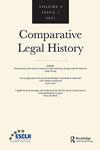一个开明的影子?马耳他刑法编纂时期的思想氛围要素
IF 0.5
Q2 LAW
引用次数: 0
摘要
《马耳他刑法》是1854年在英国统治下编纂的。在此之前,马耳他的刑法受圣约翰骑士团政府颁布的1784年《市政法典》的约束。在这两种情况下,马耳他人自己都积极参与了法律案文的制定,在这两种情况下,他们都明确提到马耳他民族和法律及其与国家的名义关系以及这种关系的后果。因此,问题就来了,在马耳他,法籍的说意大利语的侨民属于法国公社传统,法籍的侨民是否将刑法国家化,对启蒙运动是有影响的,并试图抵制在一个普通法体系不信任法制化的统治者占领下的完全接管。本文章由计算机程序翻译,如有差异,请以英文原文为准。
An enlightened shadow? Elements of the intellectual climate at the time of the codification of the Criminal Law of Malta
The Criminal Law of Malta was codified in 1854 under British rule. Prior to that, Maltese criminal law was subject to regulation by the Municipal Code of 1784, promulgated by the government of the Knights of St John. In both instances, the Maltese themselves were active in the creation of the legal text, and in both cases, they explicitly referred to the Maltese nation and to law and its notional relationship with the nation and that relationship’s ramifications. The question therefore arises whether codification nationalised criminal law in Malta, where a Frenchified élite that spoke Italian belonged to the ius commune tradition, was alive to the Enlightenment, and sought to resist a complete take-over under the occupation of a ruler whose common-law system mistrusted codification.
求助全文
通过发布文献求助,成功后即可免费获取论文全文。
去求助
来源期刊
CiteScore
1.70
自引率
0.00%
发文量
20
期刊介绍:
Comparative Legal History is an international and comparative review of law and history. Articles will explore both ''internal'' legal history (doctrinal and disciplinary developments in the law) and ''external'' legal history (legal ideas and institutions in wider contexts). Rooted in the complexity of the various Western legal traditions worldwide, the journal will also investigate other laws and customs from around the globe. Comparisons may be either temporal or geographical and both legal and other law-like normative traditions will be considered. Scholarship on comparative and trans-national historiography, including trans-disciplinary approaches, is particularly welcome.

 求助内容:
求助内容: 应助结果提醒方式:
应助结果提醒方式:


